I – As Capua and Syracuse were besieged, in Spain the Scipioni in order to consolidate the victories against Asdrubale Barca and the other Carthaginian commanders, led into the alliance with Rome the populations previously under the Carthaginian rule.
Moreover, the Punici (or Carthaginians), fearing that the Roman advance would deprive them of the land that for many years, with its riches, had assured them all sorts of good, ordered Magone Barca to lead in Spain troops and money promised to Hannibal.

Magone Barca
To oppose the Scipioni our enemies got three armies, one commanded by Asdrubale Barca, the other by his brother Magone and the third by Asdrubal son of Gisgone.
The Scipioni, unwilling to give their enemies time to train their men, decided to go to the attack. Gneo, strong of a legion and twenty thousand Celtiberian mercenaries, tackled the task of facing Asdrubale Barca.
Publius with the bulk of the army would oppose Magone and Asdrubal Gisgone, while the Roman fleet had to prevent the Carthaginians from disembarking.
II – Asdrubale Barca consolidated near the town of Amtorgi, located in the south of Spain on the bank of the upper course of the Baetis river (Guadalquivir), Gneo from Tarraco started, with his army and the Celtiberi mercenaries, encountering the enemy.
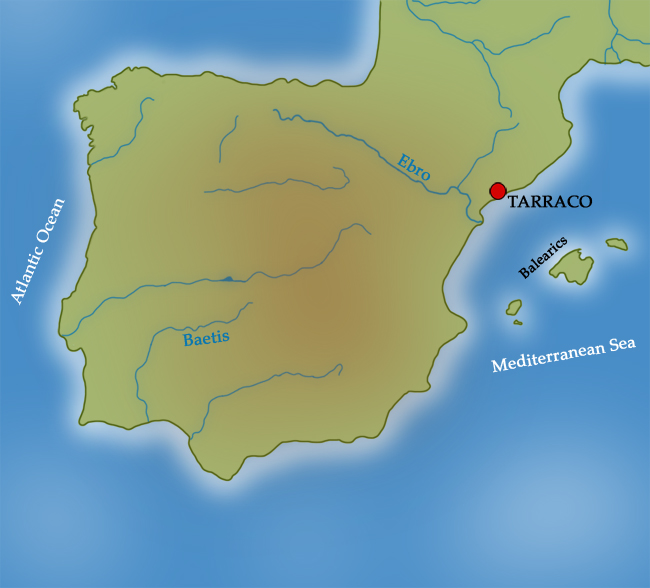
Asdrubale as he had a large number of soldiers, however was not confident about the experience of his troops, mostly recruits.
Therefore, through the Spaniards, who militated in his army, promised the chiefs of the Celtiberi great prizes if they had defected by betraying Gneo Scipione. They did not find it shameful to accept the Carthaginian proposal, so Gneo unexpectedly abandoned by the mercenaries, found himself at the mercy of Asdrubale Barca.
Recognizing he did not have enough strength to cope with the enemy, nor could reunite with his brother, Gneo decided to retreat ordinarily, pursued by the Carthaginians.
At the same time Publio Scipione, who was in the vicinity of Cartagena, was daily attacked by the Numidian cavalry commanded by the young Masinissa.
Publio, known that Indibile was approaching with a strong contingent, willing to join the Carthaginians.

Indibile
Not to allow the enemy forces to increase further, Publio decided to attack Indibile wherever he was. Left in the camp a garrison commanded by the legate Tiberio Fonteio, departed night time, went on hunting for Indibile.
The next morning, encountered the enemy in the march, attacked resolutely, but when he was already anticipating the taste of victory, the Numidian cavalry, he thought to have shaken off, attacked him. Publio turned the insignia prepared to resist the new enemy.
The battle became desperate when Magone and Asdrubal of Gisgone surrounded the Romans.
Publius,
realizing that the situation was hopeless, advanced on the front line, fell heroically.
When the enemies saw the Roman commander lifeless raised high shouts of joy, dispersing themselves to announce the victory.

Publius Scipione
III - In this situation Asdrubale Gisgone and Magone Barca showed little good sense, in fact instead of pursuing the Romans, who now gave ground hopeless, they decided to bring aid to Asdrubale Barca.

Asdrubale Gisgone
The surviving Romans, led by centurions, first reached the camp garrisoned by Tiberio Fonteio then, after a brief rest, they set out to Tarraco, while Fonteio was waiting for Gneo Scipione.
Gneo meanwhile, having no news of his brother, when he saw Magone and Asdrubale Gisgone arrive, was taken aback, fearing that only the defeat of Publio could have caused such an arrival.
He therefore decided to withdraw as much as possible.

Tiberio Fonteio
Next morning when the Carthaginians saw that Gneo had taken up the camp, they sent Numidian cavalry to chase him.
When Gneo saw the advancement of the enemy secured his men on a high place where the Numidians did not dare to advance. Raised a barricade of fortune to resist to the bitter end.
The next day came Asdrubale Barca too.
It was easy for such a large army to defeat the Romans.
Gneo seeing approaching the end, ordered the soldiers to flee to the nearby woods, to reach the camp defended by Fonteio.
He himself with a few of his own, who did not want to abandon their commander, fearlessly faced death.

Gneo
And once again the Carthaginians did not take advantage of their good fortune, in fact they did not pursue Gneo soldiers, but confident that with the death of the Scipioni the war was over, they indulged to festivities.
Instead, Gneo soldiers from the woods reached the camp where Tiberio Fonteio was waiting for them.
From here all together went to
Tarraco.
IV – The death of the Scipioni was felt in Rome with no less pain than fear.
Whoever would now have restrained the Carthaginians?
Who would have prevented them from reaching Hannibal in Italy?
Much of the Spanish peoples expressed deep sympathy, especially for the death of Gneo, who had been in Spain for eight years and was endeared for his moderation and for the fairness with which he had treated both friends and enemies.
They also feared that the Carthaginians, no longer braked by the Romans, would have imposed their cruel rule, however, and perhaps for this reason, the allied peoples of Rome did not defect.
Their trust was rewarded.
In memory of the Scipioni in Tarraco a sepulchre was erected.
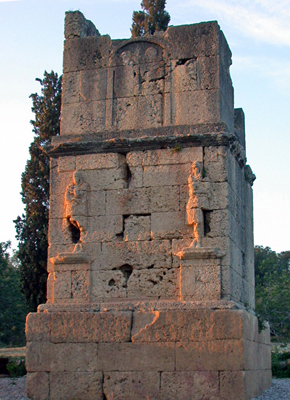
Sepulchre of Scipioni
The Roman Senate, unwilling to lose Spain at all costs, ordered Gaio Claudio Nerone to choose from the troops who had commanded at Suessula, six thousand infantry men and three hundred knights, and to enlist as many infants and eight hundred knights among the Latins.
Nerone, embarked the troops in Puteoli, sailed for Tarraco, where received by Tiberio Fonteio the survivors of the Scipioni armies.
Knowing that the Carthaginian commanders had again split, after a few days went out from Tarraco, hunting Asdrubale Barca, who had consolidated near Iliturgi (Mengibar in Andalusia).
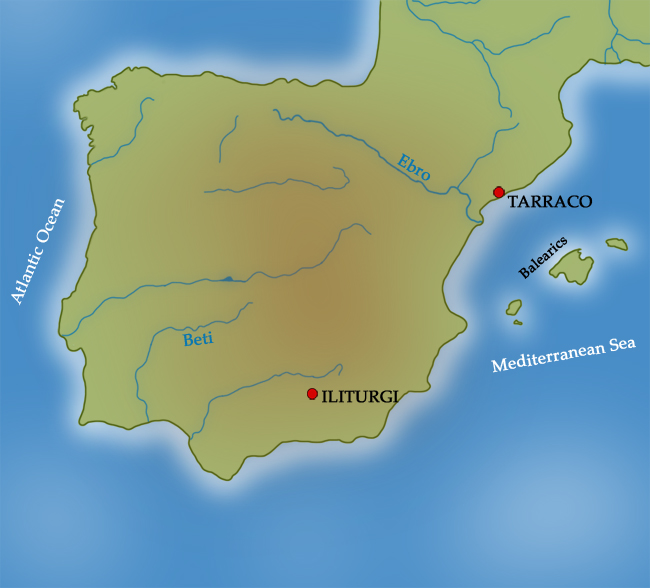
Nerone, taking advantage of the negligence of the Carthaginians, who, since they were in the south of the Spain, thought to be safe, occupied the heights around the Black Stones where Asdrubale had camped.
These one lost every hope, deceived Nerone promising every day a new thing, while in the night brought his soldiers to safety.
Too late, Nerone came to realize that he had been cheated by the Carthaginian, when he threw himself to his pursuit it was too late.
V – Capua and Syracuse captured, in Rome the Senate decided to strengthen the army in Spain and to appoint a new commander.
When the son of Publio Cornelio Scipione, whose name was Publio just as his father, made his candidacy, the popular assembly unanimously voted in his favor.
Few men are born to command, Publius was among them.
Neither was his young age impeded, he was twenty-five years old, since he had been in the Roman army already for eight years, giving repeated evidence of value and firmness.
He also had a very special fascination, which he could feed by letting himself be said to be of divine descent.
The Senators, understood that it would have been useless to try to oppose the popular will, cautiously flanked him as adjutant the pro-prateor Marco Giunio Silano;
at the same time, as said, reinforcing the contingent commanded by Publio Scipione with ten thousand infantry men and a thousand knights.

Marco Giunio Silano
The new Scipione departed from Ostia with thirty ships.
When he was near Massalia the Massalioti in his honor escorted Scipione with four ships to Emporiae.
From here ordered the ships to follow him, he went on land to Tarraco, where was reached by the ambassadors of the allied cities.
In the great meeting he began to speak and with that serenity that came from his self-confidence, with the force of persuasion that arose from his talents, comforted the friends of Rome, praising the allies for the fidelity shown in the difficulties, the soldiers for their courage and for what they had done for his father and his uncle, Tiberio Fonteio for the ability with which he had saved the survivors, the centurions for showing the invincible bastion of the Roman army.
When the session dissolved, everyone was persuaded that the new Scipione was the worthy heir to Publio and Gneo.
Payed those peoples who had sent ambassadors the visit, Scipione came back to Tarraco in the winter quarters, while Claudio Nerone returned to Rome, replaced by the pro-praetor Marco Silano.
VI – The Carthaginian commanders distributed their forces in this way: Asdrubale Barca, waiting for large supplies from Cartagena, fortified far from the sea between Cartagena and Sagunto.
Annibale Gisgone and Magone Barca set their camps near Gades (Cadiz), where they could receive supplies from Africa.
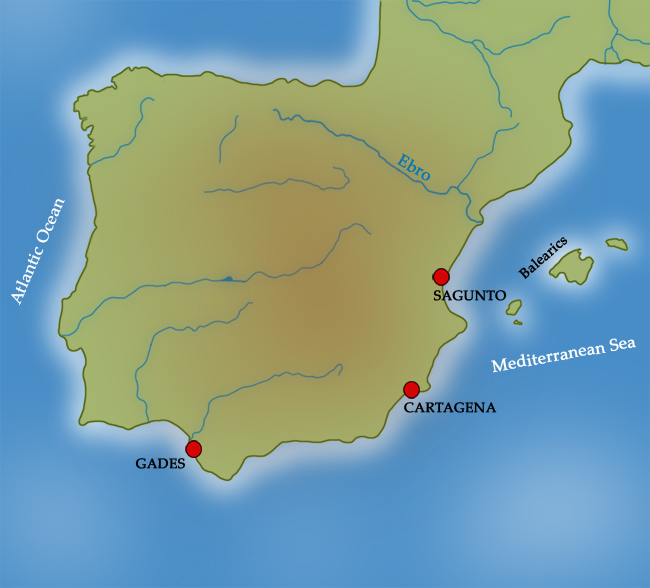
When the good season came, Scipione, summoned the allies at the mouth of the Ebro, came out of Tarraco, followed by the fleet commanded by Lieutenant Gaio Lelio,
the only one to know his designs.

Gaio Lelio
Asdrubale, expecting Scipione's attack, deployed his army in fighting trim, but was cheated by Publio, who sent against him a cavalry department with great shout, induced the Carthaginian to refuge into his own field.
Scipio, meanwhile, left Silano with three thousand soldiers to garrison the territories to the north of the Ebro, with the bulk of the army and the allies advanced towards Cartagena, having ordered Gaio Lelio to proceed slowly with the ships, so that at the same time the city was undermined by land and by sea.
Cartagena was the most important city in Spain, here the Carthaginians kept the hostages that had been handed over by various peoples, here it was their treasure, here they had packed enormous quantities of wheat, their arsenal was here, with innumerable war machines.
Taking Cartagena would be a wonderful enterprise for the Romans, for the Carthaginians a catastrophic loss.
Asdrubale Barca, who was the most experienced of Carthaginian commanders, showed himself more skillful in weaving frauds than in carrying the war, leaving in Cartagena a little garrison, perhaps trusting that, having been on a few days of march, in case of need he might have run into his defense.
So he ran a risk, however, inexplicable.
Later on, however, we knew that in those days he had departed from his camp.
VII – Went over Sagunto, Scipione summoned his army.

Scipione
In front of the tribune, the Aquiliferi (the soldiers who brought the eagle of each legions) aligned with the Signiferi, (those who brought the insignia) while the Vessilliferi fluttered the flags.

Legion Eagle
The centurions advanced, followed by the veterans.
When the commander rose to the tribune, a great silence came down.

Signiferi
Then Scipione pronounced his allocution.
He began by recalling his militia begun eight years earlier in Ticino, then the Trasimeno, then Canne, the annihilated Roman armies, the commanders dead with the weapons in their fist.
Then again the betrayal of Capua and of Syracuse.
To these fatal memories a great emotion shook the soul of the soldiers.

Centurions
“And yet - continued Scipione - not even in those disastrous days we accepted the idea of a shameful peace.
Right was our unshakeable virtue, for now the immortal gods are propitious.
Fulvio has regained Capua, Marcello Syracuse and Levino defeated Philip the Macedon, who allied with Hannibal was preparing to cross the Adriatic Sea.
Today my soul, which until now has always told me the truth, has predicted that Spain will be ours, and what the mind predicts is confirmed by the infallible reason”.
At this point, when everyone's eyes were fixed in his, he revealed his plans.
“Soldiers I’m leading you to conquering Cartagena, you will escalade the walls of a single city, but with that single city you will conquer the whole Spain. There Carthaginians hold the hostages of all the Spanish peoples, as soon as they will be in our hands, free from fear those peoples will come to our alliance.
In Cartagena the enemy carries their treasure, which is indispensable to pay the mercenaries, in Cartagena they have accumulated war machines, weapons and all sorts of war apparatus, in Cartagena they have stored huge amounts of wheat.
For them Cartagena is fortress, barn, revenue, arsenal.
Between the Pyrenees and Gades this is their only landing.
Soldiers give your support to the Scipioni descent and you veterans guide beyond the Ebro a new army, a new commander and in short you will recognize in my face that of Gneo and Publio, who with your loyalty, your value, you have for so many years served, lead the Scipioni descent to victory, lead the arms of Rome to victory”.
Fascinated by an irrepressible enthusiasm, almost without waiting for the orders, the legionaries took the alignment.
Nothing could stop them.
In seven days we came from the Ebro's mouth to Cartagena.
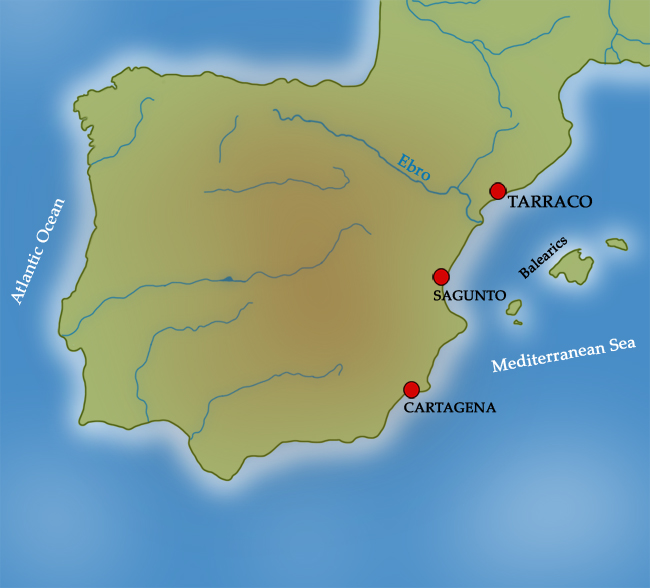
VIII – At the same moment we arrived from land, Gaio Lelio appeared on the sea.
Scipione knew well that our hopes of victory were based on surprise, not to give Asdrubale Barca the time to run with his army in defense of Cartagena.
Therefore, as soon as the camp was fortified, our legionaries, drew the stairs up to the walls, tried to escalade. But the walls of Cartagena were very high, nor the stairs were sufficiently long or sufficiently solid to bear the weight of our soldiers.
Seeing vain the attempt Scipione ordered the retreat. Meanwhile Gaio Lelio sent sailors to explore the pond that, bordering the harbor, reaches the meridional side of the walls.
They discovered that at low tide, the pond could be crossed on foot. Scipione, informed by Lelio, sent five hundred men, among the most valued, to be ready for his orders.
Almost as the wind was at Scipione's orders, it began to blow from the north, pouring the water of the pond into the sea. In that our commander ordered our legionaries to crowd on the opposite side of the walls to attract the enemies, who, on the other hand, trusted in the protection of the pond.
Given the signal, the five hundred men, swiftly crossing the pond, escaladed the walls.
When the Carthaginians realized what was going on the ours were already in the city and disrupted the gates of the walls to enter the army. The commander of the Carthaginians garrison tried an extreme defense in the fort of the city, but when he saw it was hopeless, handed himself and the fortress to the Romans.
A vast booty was made, all gold and silver after being thoroughly weighed was handed over to Gaio Flaminio.
Eight warships, dropped into our hands, were added to Lelio's fleet, sixty freighters were captured in the harbor, many with their cargo.
Scipione took personal care of the hostages, willing to reconcile the Spanish peoples with his generosity.
IX – The news of Cartagena's fall briefly spread across Spain and with it Scipione's fame, who prompted Gaio Lelio to embark on a war ship, ripped from the enemy, sent him to Rome to announce his victory.
Lelio led the commander of the Carthaginian garrison and fifteen senators who, by chance found themselves in Cartagena, were captured. Lelio also carried on the escort ships gold, silver and countless prisoners.
Coming to Rome was welcomed into the Forum by the jubilant people.
The senate proclaimed a day of celebration, ordering Lelio to return to Spain as soon as possible with those same ships with which he had come.
In Italy meanwhile, Hannibal, lost Capua, without hopes of aid from Sicily and Philip V, still tried to capture the fortress of Taranto, blocking the port with a fleet, to starve the besieged Romans.
But the grain supply was just enough for the ship's crews, so the same famine struck besieged and besieging. But the Romans were few, so the few supplies made to the fortress by loyal friends were enough to feed the soldiers of Marco Livio.
Hannibal was forced to give up the naval blockade.
At that same time, the consul Marcello tore up to the Carthaginians various cities in Apulia and Sannio. Then Hannibal decided to face Marcello.
A first clash took place in Numistrone (Muro Lucano) with uncertain outcome. Given that he did not achieve the hoped results, Hannibal, fearing the desertion of other Apule cities, retraced his steps, always followed by Claudio.
There were no real battles, but constant strikes between the Roman avant-garde and the Carthaginian retro-grade. Marcello wanted to wear down Hannibal, who was trying to trick Marcello.
 |
 |
| Marcello |
Hannibal |
Things were at this point when there was a conflict between the two consuls.
The Senate had called Marcello to summon in Rome the popular assembly for the election of the new consuls. Marcello asked to be dispensed because he could not leave Hannibal even from one foot.
Understanding the motives of Marcello, the Senate turned to
Levino, who had in the past had shown an undoubted rivalry to his colleague, created many of those difficulties to force Marcello to go to Rome, where in order not to waste time appointed dictator for the election of consuls Quinto Fulvio Flacco.

Levino
Finally were elected consul Quinto Fabio Massimofor the fifth time and Quinto Fulvio Flacco for the fourth.
At Fabio was assigned the war against Taranto, Fulvio Bruttio and Lucania, Marcello was prolonged for one year the command in Apulia, and Scipione the command in Spain without time limit.
 |
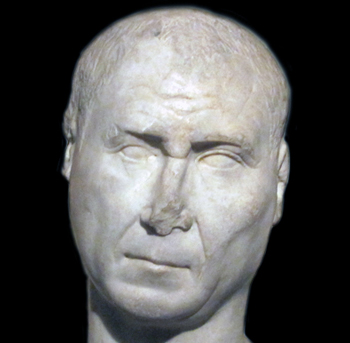 |
| Quinto Fabio Massimo |
Quinto Fulvio Flacco |
It was also ordered that from Sicily had been sent to Taranto for Fabio thirty big war ships.
X – In Lucania, handed the Carthaginian garrisons over to the Romans, they various towns surrendered to Fulvio Flacco.

Among these Volcei,
situated on a hill dominating the valley of Tanagro,
controls the road,
many times covered by Hannibal, where converge the roads coming from Bruttio and Taranto to continue towards Capua.
Moreover, in the Volcei area, rich in water, olive trees lumber, and of every kind of animal, large herds of horses, oxen and sheep are reared.
In his approach to Taranto, the consul Fabio captured Manduria, an ancient city founded by the Cretans, meanwhile asking Flacco and Marcello to keep Hannibal far from Taranto.
Marcello reached the Carthaginians at Canosa where various clashes with uncertain outcome occurred. In vain, the Carthaginians advanced with the elephants, who struck by the javelins and the arrows of the Romans, revolted against their own guides.
Many were injured on both sides. Hannibal then decided to retire to the Bruttio, while Marcello for the many injured could not pursue.
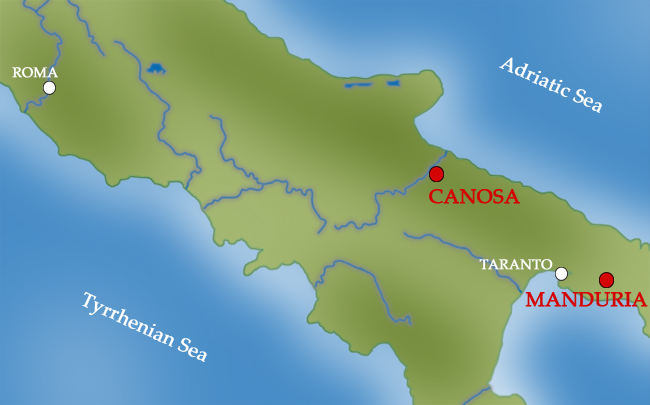
Fabio arrived in Taranto fortified in front of the harbor.
On ships arrived from Sicily were loaded war machines to attack the city walls.
In the Carthaginian garrison occupying Taranto there were some Bruttii, who through a fellow country-man, with the promise of a great prize, were tempted to betray the Carthaginians. Fabio, found the agreement with the Bruttii, at midnight ordered the Romans who were in the fortress and his troops holding the camp at the entrance to the harbor to play the trumpets with great rumble, while he was concealed to Orient.
Democritus, who commanded the Carthaginian troops in that part of the city where Fabio was, seeing that calmness was around him, moved as fast as he could where the clamor was. Then with the help of the Bruttii the Romans escaladed the walls and broke into the city making an indiscriminate massacre. Democritus fell fighting, the commander of the Carthaginian garrison was killed by a soldier as he was about to surrender to Fabio.
Hannibal, informed the Romans were attacking Taranto, departed from Caulonia, but known that the city had fallen, stopped at Metaponto.
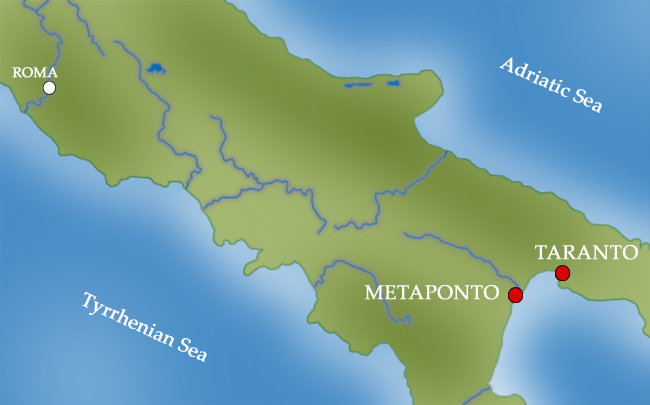
XI – With the fall of Taranto Hannibal's situation had become desperate.
Few were the survivors of the army with which he got to Italy, Maarbale had disappeared, Philip the Macedon, undermined by Etols (a Greek people) and Romans, could not leave his lands, Capua had fallen, from Sicily, firmly in Roman hand, could not wait for help, the access to the Tyrrhenian sea was forbidden, he could receive supplies only from the two small ports of Locri and Crotone, and as if it were not enough, the Senate of Carthage sent to Spain most of the money and troops that could recruit.
 |
 |
| Maarbale |
Philip the Macedon |
Any other leader, folding the insignia would return home.
Not Hannibal.
He had one last card to play, the help of his brother Asdrubale.
In Spain Scipione welcomed in the covenant the brothers Indibile and Mardonio,
among the most powerful kings of Spain, to whom he handed over the respective wives and children, who in Cartagena were hostages of the Carthaginian, in spring, came out of Tarraco to reach Asdrubale Barca, who had fortified at Baecula (today Santo Tomé in Andalusia).
This was a clever move by the Carthaginian, attracting Scipio in the south of Spain to keep free the inner roads leading to the Pyrenees, to continue to Italy in the rescue of his brother.
Informed Asdrubale Gisgone and his brother Magone of his plans, he asked them to move from the nearby Gades where they were to keep Scipio engaged.
When he was reached by the Roman leader escaped the battle retreating over the nearby heights. In the meantime, he had sent elephants and part of the army to the Pyrenees, approaching Magone and Asdrubale Gisgone, took the flight with the money necessary to carry out the task.
It was Scipione's turn to be in a critical situation, if he pursued Asdrubale Barca would leave a free field to the Carthaginians, if he had faced Magone and Asdrubale Gisgone would leave free Asdrubale Barca to cross the Pyrenees, therefore sent a garrison to preside the Pyrenees, he prepared for the clash with Asdrubale Gisgone and Magone.
But the Carthaginians, reached the target, parted. Magone, consigned most of his army to Asdrubale Gisgone, went to the Baleari isles to hire mercenaries (still today the port of Menorca takes the name Mahon) while Asdrubale Gisgone to escape to Scipione marched to the interior of the Lusitania.
XII – In Rome, when the consulate of Marcello and Levino was going to end, the senators with a deep concern for the arrival of Asdrubale wanted the new consuls to be elected as soon as possible, the senators judged Gaio Claudio Nero a man of great quality, but too imprudent and impetuous, therefore it was to be flanked by a wise and circumspect leader and, moreover, as prescribed by law, plebeian.
Marco Livio Salinatore seemed to be the right man. Marco in 221, together with Lucio Emilio Paolo, had victoriously led the second Illiric war, obtaining the honor of the triumph with his colleague, but shortly later accused, with his colleague, to have retained part of the spoil, was sentenced. Patrician Lucius Emilio, belonging to the powerful gens Emilia was rescued.
 |
 |
| Gaio Claudio Nero |
Marco Livio Salinatore |
Livio, left Rome in voluntary exile, keeping away from any human relationship.
He was brought back to Rome by the consuls, anywhere he repeated: “if he had been convicted why they now offered him the consulate?
Then had not pity and now they offered him the toga candida!”
The insistence of the people and of the senators at last bent Marco Livio.
Quinto Fabio Massimo took the initiative to reconcile the two consuls, divided by an harsh and old rancor.
Finally, to avoid further problems they were destined to the extreme of Italy, Claudio was assigned the Bruttio and the Lucania against Hannibal, Livio the Gaul, waiting for Asdrubale.
The imminent arrival of Asdrubale caused an increasing concern among the Romans, especially when the Massalioti, announced that he was reaching the Gauls, awakening great hopes, as he was said to have a lot of gold to hire mercenaries.
It was anticipated that by the next spring he would have crossed the Alps to get into Cisalpina and join the Insubrians.
Therefore, for the protection of Etruria, which, due to the continuing devastation had to undergo, was in a state of comprehensible agitation, Gaio Terenzio Varrone was destined with two legions.

Gaio Terenzio Varrone
Since Livio did not have too much confidence in his two legions, while Claudio Nero had an excellent consular army and in case of need could expect the support of the legion that the Praetor Quinto Catio held at Taranto, asked the Senate for the permission to recall the veterans.
The Senate gave full power to both consuls.
Scipione, knowing that Livio, in order to reinforce his army, wanted to recruit veterans, asked how many of us were willing to go as volunteers in the rescue of our homeland. Three cohorts of infantry men (about 1200 men) were formed. Scipione granted me the insightful honor of commanding the contingent as his legate. To this contingent Scipione added five hundred knights. We embarked at Tarraco on the ships led by Gaio Mamilio.
Meanwhile contributed to the panic, a letter from the praetor Lucio Porcio after which Asdrubale was preparing to pass the Alps, having hired eight thousand Ligurians.
As often happens in these cases, inexperienced commanders, exaggerating the magnitude of dangers, create confusion.
Vice versa Marco Livio, caught up in Cisalpina by veterans, was not disturbed by uncontrollable news, asked the most reliable Gaio Terenzio, headed for the Metauro river gorges, about forty miles (60 Km) south of Rimini, while Gaio Terenzio, protecting the Apennine passes, would have prevented Asdrubale from coming to Etruria.
XIII – Asdrubale as it approached the Alps, increased his forces by engaging among the Transalpine Gauls infantry men and knights.

Gaul Knights
At the beginning of spring he was ready to cross the Alps, following the path traced by his brother ten years earlier. The Gesati, who had opposed the passage of Hannibal, having realized that the Carthaginians wanted nothing other than crossing the mountain passes to enter the Cisalpina, richly remunerated, agreed to provide guides to Asdrubale.
The Taurini retired to the most internal valleys of their territory, while the Insubrians welcomed the Carthaginians.
They thought that if Hannibal had inflicted heavy losses on the Romans, the two Carthaginian armies would have annihilated the power of Rome.
Asdrubale informed that the Appennine passes were strongly guarded by Gaio Terenzio Varrone, continued his march along the Po river.
And here the Carthaginian made his first mistake, in fact, coming near Placentia, instead of continuing to reach his brother as soon as possible, perhaps poorly advised by the Gaul mercenaries who expected a big booty, turned to the attack of the Roman colony, that laying on the plain seemed to be an easy prey.
But the strong walls of the city were defended by valiant veterans.
In vain spent ten days Asdrubale lifted up the siege heading to the lands of the Boi Gauls.
The delay favored Marco Livio, who attested in the gorges of the Metauro at the same time organized his own army and prepared pitfalls.
The consul, relying mainly on the veterans' experience to train the rest of the troops, named, equated with military tribunes, five legates, each of whom had the command of three cohorts of volunteers. I was confirmed to the command of the "Spaniards" volunteers.
To each legate were given the insignia, then each legate led the alignment of the volunteers, followed by ten cohorts of the regular army.
Every day we went on to train the less experienced.
When the maneuvers began to occur neatly Livio ordered a new alignment, dividing the infantry into sixty-five cohorts, fifteen of which constituted the reserve.
Each cohort was assigned its own insignia, the tribunes designated the antesignani (the soldiers committed to defend the insignia), choosing them among the volunteers, behind the antesignani in each maniple (about 150 soldiers) were mixed volunteers and regulars, followed in the rearguard by archers and slingers.

Slingers
We resumed training until Livio felt satisfied, then led us where he thought would be the battlefield.
We discovered how steep the Metauro gorges were and how well were suitable to any kind of pitfall.

Metauro gorges
Archers and slingers began to know the places where their work would have been more ruinous for the enemy.
All these maneuvers under the eyes of the consul reinforced the trust of everybody, volunteers and regulars.
XIV - In Apulia Hannibal, emerged from the winter quarters, marched to the attack of Grumentum (today Grumento Nova in Lucania), with the intention of regaining that important city a short time before passed to Romans.
The consul Claudio Nerone, keeping the tracks of Hannibal, left Venusiam to go to Grumentum's rescue.
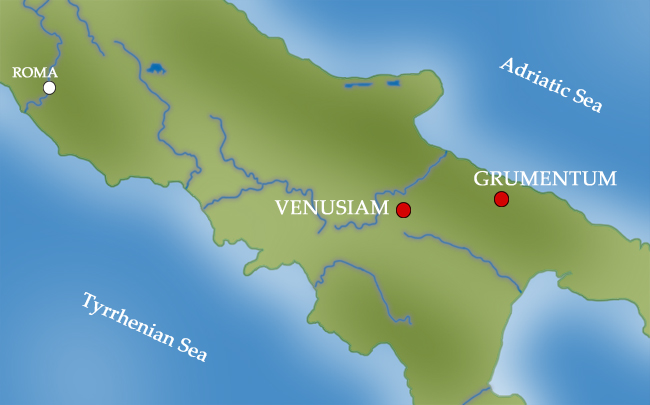
Hannibal, lost the surprise, avoided fighting, unwilling, waiting for his brother, to waste energy and men in a battle for him secondary.
From Grumentum moved to Metaponto, where the commander of the Carthaginian garrison handed over his troops, to go to Bruttio to enlist a new army.
While left Metaponto Hannibal went to Canusiam.
Claudio always following the Carthaginian, asked Quinto Fulvio Flacco to go to Lucania, not to leave defenseless that region, while with his troops returned to Venusiam. Realizing that Hannibal did not intend to fight the consul was burning impatiently, when he learned from deserters that Asdrubale would go down through the Metauro to meet his brother.
Then, giving reason to those who judged him more impetuous than shrewd, he conceived the drawing, not solicited by Livio, to go to his aid, with six thousand chosen infantry men and one thousands knights, leaving his army command to Quinto Catio.
Later Quinto Fabio Massimo in the Senate censured this decision with which the consul abandoned his army defying the Fate. Which would have happened if Hannibal had attacked an army without the commander?
When Livio learned of Claudio's arrival, he concealed his concerns, in fact he had to find a way to employ the newcomer without having to change his plans with this untimely arrival.
Asdrubal meanwhile, in an attempt to recover lost time in the Placentia siege, advanced in forced marches toward the ancient territory of the Senoni Gauls.
Coming not far from Ariminum, heavily guarded by our colonists, through narrow hills he entered the mouth of the Metauro gorges.
XV – At the same time Claudio Nerone, left Venusia, advancing to the maximum of his possibilities, reached Livio. At the first dusk he secretly entered the camp of Livio, where his soldiers were arranged in our tents.
The enemies having sense of some movement, sent scouts to see what would happen in our camp, but noted that nothing had changed, they reported to Asdrubale that there was no news.
In our camp, as soon as Claudio arrived, the war council was convened.
For Claudio's lively insistence, who could not leave his army too long in Apulia without Hannibal became aware of his absence, but above all for the needs of the war, after Livio's proposal was decided to attack the enemy next day.
Livio did not want Asdrubale had time to get acquainted with these dreadful places, he also thought that the enemies were tired because of the rapid advance, which in a few days had brought them from the plains of Placentia to the Metauro.
In the adversary field also Asdrubale intended to fight as soon as possible, for the purpose he had set his camp about two miles from our.
But in the morning he was struck by a tremendous suspicion, in fact, in the Livio’s camp, the trumpet, which called to gather soldiers, had played twice as if there were two armies, two commanders.
This could mean that the other consul had rejoined Livio.
Asdrubale, worried that his brother had been defeated by Claudio, differed the battle.
In addition, taking a look at the site, he noticed that in those narrow gorges, both his vast cavalry and elephants could not advance without falling under the arrows and bullets of the Romans.
Afraid of falling into a trap, the night on the first guard duty (between eighteen and twenty-one hour), abandoned the camp, began to retreat. But in the dark of the night the guides, panic-stricken, fled.
The Carthaginians, while wandering without a goal, were tormented by the praetor Lucio Porcio Licinio, who, advanced after Livio’s orders, now prevented them from passing through the narrow gorges, now attacking their flanks, playing fooled the immense enemy army.
Asdrubale, realized wandering in the darkness was useless, camped at the best on the shores of the Metauro river, hoping in the light of day to find a comfortable ford. But according to Livio's plans, Claudio with the cavalry, along the narrow paths indicated by the guides, outflanked the Carthaginians, preventing them from retreating to the sea.
On the new day, Asdrubale's army, exhausted for the night march, and the constant attacks of Licinio, began to disband. Gaul mercenaries, undisciplined according to their costume, intended to rest, in vain Asdrubale warned them about the imminent danger.
Then occupied with the heavy infantry a hill, prepared for the battle.
In that predicament, at Livio's command, we advanced, while our archers and slingers plagued the enemy from the top.
Under the shooting of ours the Carthaginians missed the alignment, at that time Livio ordered the attack.
Asdrubale opposed advancing the elephants followed by the Spaniards and the Ligurians, but Claudio attacked the enemies at the back.
The elephants hunted by innumerable arrows, flew to their camp, before overwhelmed everything, they were killed by their own conductors.
We went to the assault, at first clash of shields we overthrew the enemy.
From that moment on, was no more battle, was slaughter.
The Gauls, abandoned the insignia, hardly held their weapons on the shoulders, part of them were killed, most of them captured.
Asdrubale surrounded by everywhere, seeing the end of every hope, spurred his horse, dushed against our cohort, seeking death.
It is said that Claudio Nerone ordered to hand over to him the head of the Carthaginian leader, which kept carefully, was taken to Hannibal.
XVI – In Rome the people were eagerly awaiting news.
Heard that some knights were coming from the Metauro to the Forum,
a large crowd ran up to them, forcing to read from the Rostri (the tribune of the Forum) the message they had before they went into the Senate.
Caught by surprise and incredulity people was waiting for an official confirmation .
Learned that Livio's messengers were coming, each one realized that the message read by the knights was true.
The messengers, hardly entered the Senate, read Livio's concise message.
The enemy had been defeated, Asdrubale's army was annihilated, Asdrubale had died.
Passing on to the popular assembly, Lucio Veturio exposed all the details of the events, greeted by a rumble of joy.
The crowd dispersed some ran to the temples to thank the gods, others ran home to share happiness with the family. The Senate resolved that three days of thanksgiving ceremonies be made.
The Senate decreed that, when he deemed it opportune in the interest of the Republic, Marco Livio Salinatore came to Rome with his army celebrating the triumph.
Claudio Nerone was allowed to accompany Livio on horseback (while Livio would proceed on a biga).
It was on this occasion that Quinto Fabio Massimo harshly rebuked Claudio Nerone to have prevailed his personal ambition to the good of the homeland.
Hannibal, beaten by immense mourning, is told said he saw in this occurrence the ruin of Carthage.
Then he concentrated in Bruttio all the militia dispersed in Apulia and Lucania.

